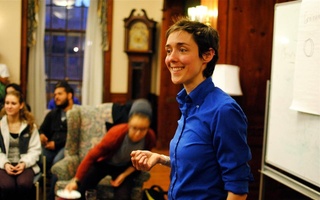
Harvard's famous literary alumni include E. E. Cummings '15, Michael Crichton '64, and Norman Mailer '43.
In the 1930s, the man who would become the Poet Laureate to the Library of Congress applied to The Harvard Advocate—and was rejected.
“I wasn’t a very good writer then; perhaps I should have been turned down,” Robert Lowell said in an interview with the Paris Review in 1961. Though the rejection must have stung at the time, it did not deter Lowell from a career in poetry.
But the Advocate, the oldest continually published college literary magazine in the country, has had a history of publishing famous Harvard wordsmiths, from T.S. Eliot to John Ashbery. Other student-organized institutions here have trained their shares of notable writers—John Updike was a member of a semi-secret Sorrento Square social organization that used to occasionally publish a so-called humor magazine, David Sanger wrote for The Crimson, and E.E. Cummings helped to found the Harvard Monthly.
At Harvard today, student life is very much focused on extracurriculars, and to some students, these activities are just as important as—or even more important than—their classes. In the hypersocial setting of undergraduate life at Harvard, creative writing’s careful introspection and editing play out in ways beyond the often-solitary acts of producing original works. The Harvard students today who work together in writing classes and student-run publications are participating in a long and illustrious literary tradition at the College.
In the absence of a perfect formula for fostering future Pulitzer winners, the writing scene at Harvard is multi-faceted, varied, and as often as not, a collective rather than a solo pursuit.
THE ALLURE OF THE WRITING WORKSHOP
“Harvard is a great place to be a writer,” says Stephen L. Burt, director of undergraduate studies in the English Department. In his office on the second floor of the Barker Center, the massive bookshelves stretch from floor to ceiling. He is said by his students to be one of the most exuberant and engaging professors at Harvard, and from the way he talks about the English Department, he certainly displays the same enthusiasm for which he is known.
According to Burt, between 120 and 150 students take one of the 14 writing workshops offered by the English Department each semester. Less than half of enrollees are English concentrators, a dynamic that Burt says is maintained purposefully so that workshop participants can share feedback from many different perspectives. Admission to one of these coveted writing workshops is based on an application that includes a writing sample and personal statement.
“One of the many things I think we do right is to make the creative writing courses selective,” Burt says. Without this discretion, he explains, it would be more difficult to ensure accurate and careful grading necessary in order to offer the class for credit. Currently, courses are offered in playwriting, screenwriting, poetry, fiction, and nonfiction.
Burt says that the department promotes creative writing as an academic pursuit, but at the same time the professors realize how important out-of-class writing can be to a writer’s development. Professors are aware of the student publications, and there is no notion that academic workshops take precedent over publications like the Advocate.
Amy C. Robinson ’15, an English concentrator, is taking her third creative writing workshop in the department. She says the structure and rigor of the workshops have made these classes her favorites at Harvard so far.
But the application required to get into the classes can be a source of frustration for some students. Dennis A. Sun ’15, a Crimson designer, is one student who, after applying to a fiction-writing workshop two semesters in a row without success, decided to do something about it. Last year, Sun founded the Harvard College Writers’ Workshop with a few of his friends.
“The reason we started the workshop was to fill this hole in the creative writing community at Harvard,” Sun says. Sun had read on the English Department's website to work on his writing and then apply again the next semester, but he felt he lacked the peer input he needed to improve, a sentiment that was echoed by a few of his friends. The workshops he designed are meant to introduce students to creative writing in a more relaxed atmosphere. “We’re trying to make writing more accessible for students. The Advocate can be a very daunting place when you’re just starting to figure out how to use language in the artistic sense.”
The group started to have organized workshops led by a student moderator last semester, along with all-night writing events, and though Sun—a human developmental and regenerative biology concentrator—plans to pursue scientific research after college, he regards the Writers’ Workshop as very significant to his time as an undergraduate. “Being able to read other people’s writing is really rewarding—you get to see how people your age handle the same problems you’re struggling with in writing,” Sun says.
Since starting the group last fall, Sun has taken a writing workshop through the English Department and agrees that the level of rigor he found there made his application process worth the hassle. However, he still sees value in the Writers’ Workshop he helped to form as a way for students to get their feet wet with writing.
Read more in Arts
The Most Used (and Abused) Classical Music PiecesRecommended Articles
-
Students Discuss Sex Openly in 'Unsupervised' TalkStudents gathered to discuss issues about sex and relationships in a workshop titled “Unsupervised” on Tuesday night as part of the second annual Sex Week at Harvard.
-
 Flirting With Furniture
Flirting With Furniture -
 Tutor Helps Students Read the Signs
Tutor Helps Students Read the Signs -
Sex Workshop Discusses Consent and NegotiationIn a room in Sever Hall Monday night, cookies were passed around and tea was served—a low-key setting for the discussion of sex. For two hours, representatives from the Office of Sexual Assault Prevention and Response and Harvard College Munch—a kinky sex discussion group at the College—discussed the importance of consent and negotiation in relationships.
-
 Avia Tadmor
Avia Tadmor -
Shimabukuro Wows at Ukulele WorkshopShimabukuro is renowned for his work, having been declared a musical “hero” by Rolling Stone and having topped the Billboard World Charts for his 2011 album, “Peace, Love, Ukulele.”













